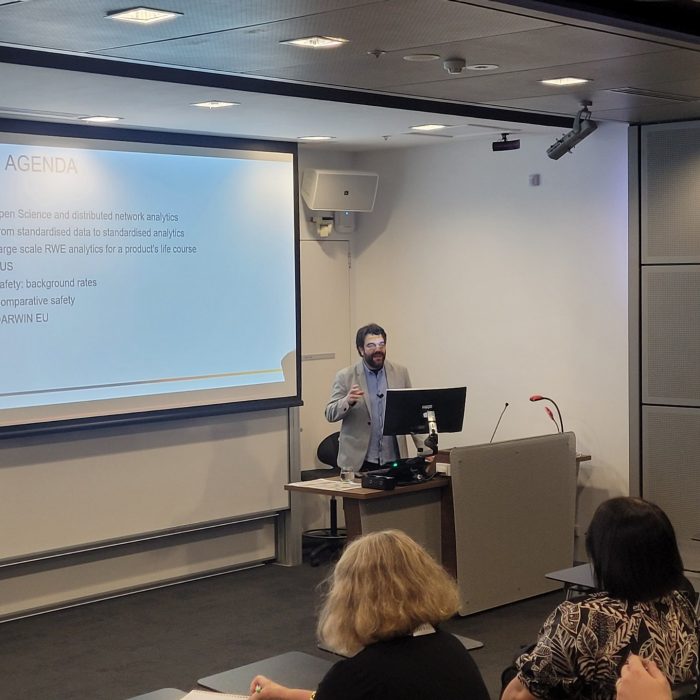MI-CRE Guest Presentations

Guest speakers and visiting fellows
MI-CRE regularly hosts visiting researchers from around the world who come to discuss their latest research, and share their insights on the latest methods in pharmacoepidemiology and working with real-world data. Below are some highlights from some of our international guest presenters.
Dani Prieto-Alhambra, opens in a new window
Professor of Pharmaco- and Device Epidemiology, Nuffield Dept of Orthopaedics, Rheumatology and Musculoskeletal Sciences, University of Oxford.
MI-CRE was thrilled to host a guest presentation by Professor Prieto-Alhambra during his short visit to Australia in March 2023. Dani's talk was titled “Data stays local – evidence goes global - What can Australia learn from the Data Analysis and Real World Interrogation Network (DARWIN-EU) Program?”.
During his visit, Dani shared his experience of DARWIN-EU and OHDSI and how we might benefit here in Australia from large-scale real-world data analytic platforms and distributed network analysis.


Samy Suissa, opens in a new window
Distinguished James McGill Professor in the Departments of Epidemiology and Biostatistics, and of Medicine at McGill University, and Director of the Centre of Clinical Epidemiology, Jewish General Hospital, in Montreal, Canada.
During MI-CRE's Annual Research Symposium and Policy Forum in November 2023 we were privileged to have Professor Suissa present on “Observational studies of new indications for old drugs: the good, the bad and the ugly.” He shared insights into understanding time-related biases in pharmacoepidemiological studies and how to avoid these when designing observational studies. This was a great opportunity for our students and researchers to learn from one of the world's leading pharmacoepidemiologists and Samy spent considerable time with them after his presentation answering questions and providing advice on their study designs.
Sonia Hernandez-Diaz, opens in a new window and Krista F. Huybrechts, opens in a new window
Sonia Hernandez-Diaz - Professor of Epidemiology at the Harvard T.H. Chan School of Public Health.
Krista F. Huybrechts - Associate Professor of Medicine at Harvard Medical School, Associate Professor of Epidemiology at Harvard T.H. Chan School of Public Health.
In January and February of 2024 we were delighted to host two events by Professor Hernandez-Diaz and Associate Professor Huybrechts as part of their visit to Australia to collaborate with UNSW Scientia Associate Professor Helga Zoega. Krista and Sonia shared their expertise on causal inference research methods through a half-day interactive seminar “Target trial emulation for medicines and other interventions in pregnancy”. A special mention to UNSW PhD candidate, Bianca Varney who also presented on her own research case study as part of the workshop.
This was followed by a multidisciplinary applied research seminar at the Royal Hospital for Women in Sydney on “Safety of opioids, anticonvulsants and second-line glucose lowering medications in pregnancy: Real-world evidence to inform shared decision-making". Over 60 clinicians, researchers and students from across Australia attended the hybrid seminar which also included presentations by clinicians Dr Antonia Shand, Head of Department of Maternal Fetal Medicine at the Royal Hospital for Women and Dr Debra Kennedy, Pediatrician & Specialist Geneticist with expertise in pregnancy care, Founder of MotherSafe.


Kris Filion, opens in a new window
Associate Professor in the Departments of Medicine and of Epidemiology, Biostatistics, and Occupational Health, McGill University.
In February of 2024 MI-CRE had the pleasure of hosting Associate Professor Filion at UNSW Sydney in association with his visiting fellowship to the University of South Australia. During his stay in Adelaide and Sydney, Kris worked closely on a number of study designs for collaborative projects with MI-CRE researchers as well as colleagues at NDARC. Kris also gave two hybrid presentations for NDARC and MI-CRE where he shared his knowledge and experience using some of the most recent pharmacoepidemiological methods, including the 'prevalent new user' design in observational studies using real-world data.
